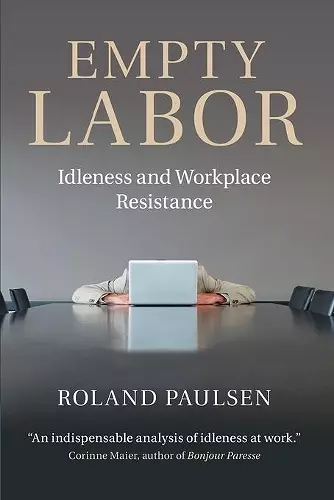Empty Labor
Idleness and Workplace Resistance
Format:Paperback
Publisher:Cambridge University Press
Published:15th Jan '15
Currently unavailable, and unfortunately no date known when it will be back
This paperback is available in another edition too:
- Hardback£100.00(9781107066410)

The first critical study of 'empty labor', the time during which employees engage in non-work activities during the working day.
This thought-provoking book examines organizational misbehavior, specifically the phenomenon of 'empty labor', defined as the time during which employees engage in private activities during the working day. Drawing on a rich selection of interview material and extensive empirical research, Paulsen explores a variety of explanations, from under-employment to workplace resistance.While most people work ever-longer hours, international statistics suggest that the average time spent on non-work activities per employee is around two hours a day. How is this possible, and what are the reasons behind employees withdrawing from work? In this thought-provoking book, Roland Paulsen examines organizational misbehavior, specifically the phenomenon of 'empty labor', defined as the time during which employees engage in private activities during the working day. This study explores a variety of explanations, from under-employment to workplace resistance. Building on a rich selection of interview material and extensive empirical research, it uses both qualitative and quantitative data to present a concrete analysis of the different ways empty labor unfolds in the modern workplace. This book offers new perspectives on subjectivity, rationality and work simulation and will be of particular interest to academic researchers and graduate students in organizational sociology, organization studies, and human resource management.
'Policymakers bemoan the epidemic of overwork. But as Roland Paulsen … explains in Empty Labor, an example-packed new book, innumerable studies suggest that the average worker devotes between one-and-a-half and three hours a day to loafing … the best way to understand a company's 'human resources' is not to consult the department that bears that ugly name but to study the basic principles of one of the world's most popular, if unrecognised, sciences: skiving.' The Economist
'Empty Labor is the most searching, theoretically informed, and high-spirited interrogation of the meaning of work and the struggle over time in the modern economy I have encountered. No reader will emerge from this grounded, heady, and discerning analysis without a new, more sophisticated appreciation for autonomy, work, and resistance. It is also, against all odds, a pleasure to read.' James C. Scott, Sterling Professor of Political Science and Anthropology, Yale University
'The theme of everyday work has been pushed to the side in recent academic scholarship on the economy, which is more interested in networks, entrepreneurship, markets and the like. But work does not go away; and as Roland Paulsen brilliantly shows, it also mirrors what goes on in the rest of the economy. Empty Labor is highly recommended reading for anyone who is more interested in the economy of everyday life than in the official economy of monthly statistics and ideology.' Richard Swedberg, Cornell University
'This admirably readable book is a wonderful antidote to all those jeremiads about the intensive 'burn-out' nature of the contemporary workplace. The workers in these pages are certainly very busy but for much of the time that busyness takes the form of finding ways to avoid work rather than seeking its embrace. Paulsen is fully and properly alert to the manner in which this 'empty labor' constitutes a powerful critique of the dominant discourse of work as the panacea for all ills.' Laurie Taylor, presenter of 'Thinking Allowed', BBC Radio Four
'Roland Paulsen reinvigorates and rethinks a long-standing but neglected tradition of social science interest in idleness or lack of work whilst at work. Empty Labor connects fascinating data about life at work to contemporary debates about, amongst other things, misbehavior and resistance, and public and private boundaries. Moreover, Paulsen does it in an unusually accessible way. This is ground breaking material in so many ways.' Paul Thompson, University of Strathclyde
'An indispensable analysis of idleness at work.' Corinne Maier, author of Bonjour Paresse
'Refreshingly bold in perspective and nuanced in exposition, this book … carves out a new place among the sociological greats. Summarizing the various schools of thought … [Paulsen] brings in a relevant, modern energy by tapping into examples of workplace idleness and forms of organizational misbehavior cataloged in popular culture … [He] has performed scholarly liposuction on the body of work that is organizational sociology, stripping away the bloated arguments about and for the value of work. What remains is a compact, comprehensive reflection on work, workers, and taboo subjects. The conversations cover the spectrum from empirical to existential in a judicious yet irreverent voice that will be especially appreciated by upper-division undergraduates and faculty … Summing up: highly recommended.' G. E. Leaf, Choice
'The brilliance of this book starts with the idea to interview employees who work less than fifty percent of their working time - yes, less than half - and continues with a totally unexpected empirical finding: it is not always because they do not want to work more, it is sometimes simply due to bad management. Paulsen also provides us with important theoretical insights in his analysis of earlier perspectives on resistance … For sociology of work it opens up a whole new field of research: empty labor.' Jan Ch. Karlsson, Journal of Economic and Social Thought
'… those interested in work - or how to avoid it - will find this book both provocative and fascinating for what it suggests is really happening in the workplace.' American Journal of Sociology
ISBN: 9781107663930
Dimensions: 229mm x 150mm x 15mm
Weight: 360g
234 pages